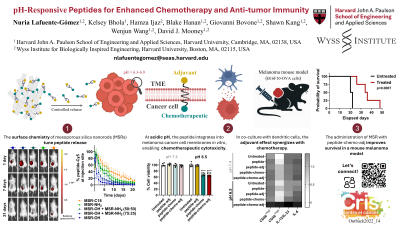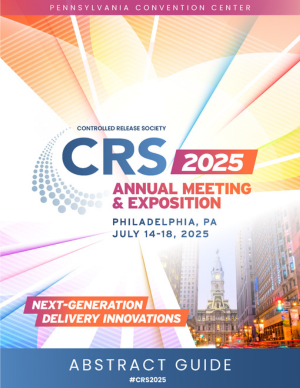Immuno Delivery (Focus Group - ID)
(232) pH-Responsive Peptides for Enhanced Chemotherapy and Anti-tumor Immunity

Introduction: This project aims to leverage the acidic pH (6.3–6.9) of the tumor microenvironment (TME), driven by elevated glycolytic activity in malignant cells[1], to target cancer cells with peptide-drug conjugates. These peptides selectively anchor to cell membranes in low-pH conditions via alpha-helical conformations. We hypothesized this could be exploited to enable dual action: releasing a chemotherapeutic drug inside cancer cells to induce cytotoxicity while retaining an extracellular adjuvant to boost anti-tumor immunity. Controlled release is achieved using mesoporous silica nanorods (Fig. 1A).
Learning Objectives:
- Appraise the potential of the acidic TME to develop peptides that target cancer and immune cells
- Analyze the role of mesoporous silica nanorods chemistry in achieving controlled peptide delivery.
Kelsey Bhola, B.S. – Harvard College Student, Harvard School of Engineering and Applied Sciences; Hamza Ijaz, M.S. – Research Assistant, Wyss Institute at Harvard University; Blake Hanan, M.S – PhD candidate, Harvard School of Engineering and Applied Sciences and Wyss Institute at Harvard University; Giovanni Bovone, PhD – Postdoctoral Fellow, Harvard School of Engineering and Applied Sciences and Wyss Institute at Harvard University; Shawn Kang, M.S – PhD candidate, Harvard School of Engineering and Applied Sciences and Wyss Institute at Harvard University; Wenjun Wang, PhD – Postdoctoral Fellow, Harvard School of Engineering and Applied Sciences and Wyss Institute at Harvard Universityte; David Mooney, Professor – Full Professor, Harvard School of Engineering and Applied Sciences and Wyss Institute at Harvard University

Nuria Lafuente-Gómez, PhD (she/her/hers)
Postdoctoral Fellow
Harvard School of Engineering and Applied Sciences and Wyss Institute at Harvard University
Cambridge, Massachusetts, United States

